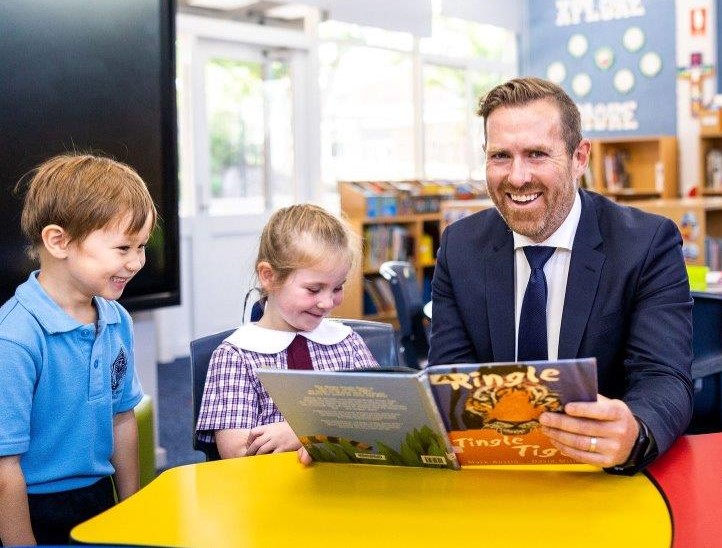Latest News

Luke Donnelly, Principal of St Thomas More’s Primary School in Campbell became a certified Lead Teacher 11 years ago, in the first cohort to go through the Highly Accomplished and Lead Teacher (HALT) certification process and the first to complete five-year recertification.
HALT is a national initiative of the Australian Institute for Teaching and School Leadership. It’s a rigorous voluntary process where individual teachers demonstrate their proficiency against the highest Australian Teacher Standards.
Luke describes it simply as ‘the best professional training I’ve ever done’.
‘It allows you to see teaching from a more macro perspective—to zoom out and see the whole context,’ says Luke of his own experience.
He observes that Australia is near the top of the OECD’s list for professional development requirements for teachers but lower on the list when it comes to measurable results. ‘This is a clue that we’d do well to look at teaching practice over excessive professional development.’
A spokesperson for the ACT Teacher Quality Institute says, ‘The processes involved in certification are based on strong international research showing the value of closely examining practice and receiving comprehensive feedback against the teacher professional standards for a teacher’s personal and professional growth.’
The ACT has the highest proportion of HALTs in Australia and Catholic Education Canberra Goulburn (CECG) places a high priority on supporting the certification of Highly Accomplished and Lead teachers across our schools in the ACT and NSW.
How Catalyst is making a difference
Luke says his Lead Teacher training perfectly complements CECG’s Catalyst professional learning program for teachers. CECG has been rolling out Catalyst in our schools since 2020.
‘Catalyst empowers teachers with evidence-based professional learning in high-impact teaching, the science of learning quality curriculum resources and in-classroom coaching that is focused on the goal of improving teacher practice,’ says Luke.
Adopting Catalyst took a lot of dedication from everyone involved—from CECG leadership to each individual staff member. CECG has provided professional learning and coaching for all teaching staff, ensuring that everyone has a deep understanding of High Impact Teaching Practice.
Part of a generation whose own schooling was inquiry based and whose education degree studies were grounded in inquiry-based learning theory, Luke found that Catalyst approach also involved a substantial shift in mindset.
‘It’s very different, but part of the difference is that it’s drawing from research on the science of how people learn.
‘Catalyst is engaging, structured, fast paced, predictable. I think students enjoy knowing what to expect. It takes some of the cognitive noise away.’
And the impact in practice?
‘I was getting good results in the classroom, but there was always a small group who struggled with reading and continued to do so in subsequent years,’ Luke says. ‘Now we’re able to step in and intervene early to stop that from happening.’
‘With Catalyst we can identify and get extra support for the small group that may struggle. We can involve support staff to deliver a scripted approach, so it’s also a good use of resources.’
What it means for the future
Parents have been delighted by what they see and the results coming through in standardised testing. ‘They’re excited about what this means for the future,’ Luke says.
He’s cautious about drawing large conclusions about a small school with a high proportion of Defence families and therefore a high turnover. ‘It’s always very cohort specific and NAPLAN is a snapshot in time,’ he points out. However, he’s ‘really proud of our students and of our amazing staff, who have worked so hard’ and energised by the challenge of sustaining high performance.
‘We’ve seen the evidence; we’re seeing the results. It’s encouraging.’
St Thomas More has about 170 students, of whom around 50 per cent in any given year are from Defence families. Despite the resulting highly transient enrolment, the school’s culture is one of stability and reassurance. ‘People always comment on the particularly inclusive, welcoming atmosphere,’ says Luke.
Stability doesn’t mean stagnation; it means having a strong foundation to build on. For Luke the most satisfying aspect of his role is ‘seeing people’s growth—not only the kids but the whole school’.
‘I’m not of the view that to always agree is good. You need to be continually questioning our practice—to have a growth mindset. Seeing that in the whole school community is incredibly rewarding.’
